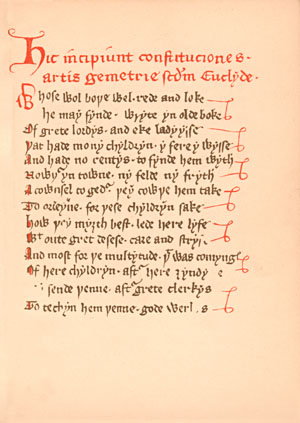En:The Regius Poem Part 4: Unterschied zwischen den Versionen
Oberg (Diskussion | Beiträge) (Die Seite wurde neu angelegt: „thumb|350px ==Regius Poem== *The Regius Poem *The Regius Poem Part 1 *[[En:The Regius …“) |
Oberg (Diskussion | Beiträge) KKeine Bearbeitungszusammenfassung |
||
| Zeile 128: | Zeile 128: | ||
{{Languages|Regius-Poem (1390) Teil 4|Deutsch}} | {{Languages|Regius-Poem (1390) Teil 4|Deutsch}} | ||
[[Kategorie:English]] | [[Kategorie:English|Regiuspoem4]] | ||
Aktuelle Version vom 25. Dezember 2010, 23:00 Uhr
Regius Poem
- The Regius Poem
- The Regius Poem Part 1
- The Regius Poem Part 2
- The Regius Poem Part 3
- The Regius Poem Part 4
- The Regius Poem Part 5
- The Regius Poem Part 6
- The Regius Poem Part 7
Thirteenth article.
The thirteenth article, so God me save,
Is if that the master a 'prentice have,
Entirely then that he him tell,
That he the craft ably may know,
Wheresoever he go under the sun.
Fourteenth article.
The fourteenth article by good reason,
Sheweth the master how he shall do;
He shall no 'prentice to him take,
Unless diver cares he have to make,
That he may within his term,
Of him divers points may learn.
Fifteenth article.
The fifteenth article maketh an end,
For to the master he is a friend;
To teach him so, that for no man,
No false maintenance he take him upon,
Nor maintain his fellows in their sin,
For no good that he might win;
Nor no false oath suffer him to make,
For dread of their souls' sake,
Lest it would turn the craft to shame,
And himself to very much blame.
Plural constitutions.
At this assembly were points ordained more,
Of great lords and masters also.
That who will know this craft and come to estate,
He must love well God and holy church always,
And his master also that he is with,
Whersoever he go in field or enclosed wood,
And thy fellows thou love also,
For that thy craft will that thou do.
Second Point.
The second point as I you say,
That the mason work upon the work day,
As truly as he can or may,
To deserve his hire for the holy-day,
And truly to labour on his deed,
Well deserve to have his reward.
Third point.
The third point must be severely,
With the 'prentice know it well,
His master's counsel he keep and close,
And his fellows by his good purpose;
The privities of the chamber tell he no man,
Nor in the lodge whatsoever they do;
Whatsoever thou hearest or seest them do,
Tell it no man wheresoever you go;
The counsel of hall, and even of bower,
Keep it well to great honour,
Lest it would turn thyself to blame,
And bring the craft into great shame.
Fourth point.
The fourth point teacheth us also,
That no man to his craft be false;
Error he shall maintain none
Against the craft, but let it go;
Nor no prejudice he shall no do
To his master, nor his fellow also;
And though the 'prentice be under awe,
Yet he would have the same law.
Fifth point.
The fifth point is without doubt,
That when the mason taketh his pay
Of the master, ordained to him,
Full meekly taken so must it be;
Yet must the master by good reason,
Warn him lawfully before noon,
If he will not occupy him no more,
As he hath done there before;
Against this order he may no strive,
If he think well for to thrive.
Sixth point.
The sixth point is full given to know,
Both to high and even low,
For such case it might befall;
Among the masons some or all,
Through envy or deadly hate,
Oft ariseth full great debate.
Then ought the mason if that he may,
Put them both under a day;
But loveday yet shall they make none,
Till that the work-day you must well take
Leisure enough loveday to make,
Hinder their work for such a fray;
To such end then that you them draw.
That they stand well in God's law.

